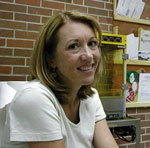By Bob Reha, Minnesota Public Radio
August 20, 2001
| Real Audio |
As Minnesota's population has become more diverse communities, small rural towns have faced a series of challenges. Perhaps the most basic is communication. Many new immigrants are unable to speak English. Often, it's the children in a family who learn English first. Although local schools are making progress, they fear lessons learned during the school year, might be forgotten during summer vacation.
| ||
A dozen people, from retirement age to college student, mingle in the kitchen of Viking Elementary School in Pelican Rapids. The attire for the day is strictly casual. The breakfast menu consists of yogurt, cereal, juice or milk and toast.
The group sits at a table in the gym and reviews plans for the day. One leads a group that will buy food for lunch, another heads the group that will cook it. All the volunteers will teach. Once plans are finalized, Bud Philbrook, president and co-founder of Global Volunteers, leads a short English lesson for the group, entitled "How to Speak Minnesotan."
Global Volunteers is a St Paul-based nonprofit organization. For the past 17 years it's provided volunteers an opportunity to travel worldwide, tutor children and teach conversational English. The group has been invited to Pelican Rapids by the town's multicultural committee and the school district.
"We're doing what we call an English Language Summer Camp. We do these all over the world. This is the first time we're ever done one in the United States," according to Philbrook.
Fifty kids, from kindergarten to sixth grade, attend the camp. They are the children of refugees and immigrants; people from Mexico, Vietnam, Somalia, and Bosnia. Most of the children's parents have moved here to work at the local turkey processing plant. Philbrook says the school has done a good job teaching the children how to speak English. But English is not their primary language at home, and over the course of the summer, lessons learned at school can be forgotten.
| ||
"Then they come back in the fall and it's difficult for them. It's difficult for anyone to learn in another language, just I studied Spanish for 20 years and still can't get it. Think about learning in another language," Philbrook says.
Philbrook says the idea isn't to discourage the kids to forget their homeland or stop using their native language; it's to give them the tools they need to succeed in their new home. Philbrook says if someone would have told him five years ago the Summer English Language Camp would be needed in Minnesota, he wouldn't have believed it.
"It truly is amazing how quickly this has occurred in this state. It's not just in Pelican Rapids; it's in rural communities and in urban communities all over the state," he says.
Carol Conzelman sits on a stool and reads to six students. The kindergarten-aged group of three boys and three girls listens closely to Conzelman read from Little House in the Big Woods.
"Kids are so intuitive," she says. "Sometimes they might not know the words, but if you're just reading a story, they can pick up a lot more than you think," she says.
Volunteers use other techniques. Kids are given words like "big," "bigger" and "biggest" and then asked to perform an action to visualize the word for the other students. Then there's the time-honored technique of walking to the blackboard and writing out the word with chalk.
Kayless Miltich teaches English as a Second Language at Viking Elementary School. She believes the summer camp will help the kids with just more than their language skills. "I'm concerned about their self esteem of who they are and I want them to be able to feel good about who they are; that this is really neat. This is cool. I speak more than just one language. Some of them speak three languages," says Miltich.
Fun is a big part of the learning process. Games are used to reinforce lessons taught in the classroom. Two years ago Muhammed Hussein Ahmabdee, 14, and his family moved to Pelican Rapids. He speaks slowly and carefully when using his new language. He's proud to master a new language.
Local officials are optimistic the camp is having the desired effect. News of the program is generating some interest in other communities. A second language camp is scheduled for Worthington in October and Austin city officials have spoken with Global Volunteers about the possibility of bringing the program to their city.


